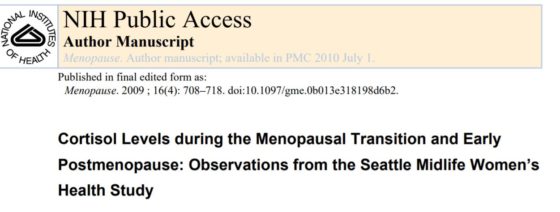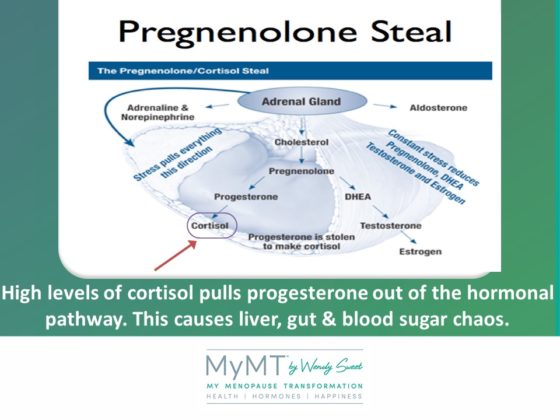I have fires as well as fire-fighters on my mind at the moment, including Elizabeth. The top of the South Island in New Zealand is burning up and a huge fire has been raging for days on end. I can only imagine the stress of everyone living in the region and for women who are also in menopause, it’s not only the heat that is the problem, but also the stress from all the uncertainty. When we are feeling stressed, our menopause symptoms become worse. Elizabeth discovered this too.
Whilst stress is a modern-day challenge that we all face, when we have life-events such as environmental disasters impacting on us as well, the accumulation of stress can throw our symptoms into even more chaos. Stress is hell for your hormones and I don’t just mean your reproductive hormones. I also mean another hormone called Cortisol.
Most cells in your body have cortisol receptors, so this lovely hormone affects many different functions in your body. Cortisol can help control blood sugar levels, regulate metabolism, help reduce inflammation, and assist with memory. It also has a controlling effect on salt and water balance and therefore, helps control blood pressure. But when we produce too much of it, that’s when we start to have problems during our menopause transition. We know a lot about over-production of this hormone from sport and exercise science and a condition in athletes called ‘over-training syndrome’. Feeling that my blood pressure, moods and hot flushes were becoming worse when I felt stressed, I was searching for better understanding of the physiology of this and the relation to menopause. I found what I was looking for in the wonderful Seattle Midlife Women’s Health Study, published in the 2009 journal Menopause.*

The study confirmed what I was feeling myself – when we are awake in the night, we feel hot and bothered and have increased night sweats. According to the Seattle Midlife study, the cause of high overnight cortisol is not just for athletes. It is also due to higher than normal feelings of stress in women, higher testosterone and changing reproductive hormones in menopause.
Finally, an answer to what I was feeling myself! I knew that I was feeling hotter than usual and of course, when cortisol remains high overnight, then this also impacts on our sleep hormone called melatonin so we lie awake for longer. Our normal fat-burning mechanisms can be interrupted too.

- Reducing sugar intake so insulin levels don’t spike.
- Moderating protein intake at dinner because our pancreatic enzymes reduce as we age and we don’t metabolise protein as well overnight.
- Doing some specific mindfulness activities to reduce blood pressure.

“I was feeling so confused about my symptoms – even some that I hadn’t even connected with menopause! It was absolutely a turning point for me listening to Wendy about the effect of stress on my symptoms.”
“Everything Wendy described made so much sense.
It was listening to her seminar that enabled me to understand what was happening to me. It also gave me so much hope that I could get back to what I loved to do. With my busy job as an Operations Manager at Ocean Shell, I also love the small community where I live near Invercargill, so I work as a volunteer Fire-Fighter.I’m a keen member of the Southland Tramping Club and love the amazing world-class walking tracks that are here in Otago and Southland. But when peri-menopause arrived, I didn’t understand why I wasn’t coping with these activities that I have participated in for years.
My body felt stressed and I was so exhausted all of the time, especially working as a fire-fighter.
Like a lot of us I have always had a busy, full ‘roller-coaster of a life’ but was really struggling for the last few years to make it all work and just feeling more and more unhappy and stressed. Since starting ‘ MY’ MyMT journey I have learnt so much. Many small steps added up to hugely, positive changes in my life. That’s why I’m also still with Wendy on her coaching group – her posts keep me updated and motivated. Over the last year since working on the lifestyle changes recommended by Wendy in her MyMT programme, I’ve lost 8 kgs.

But the best thing is that my cholesterol levels are reduced and I’m feeling so much better physically and mentally.
Since doing the MyMT programme, I’ve also improved my fitness and cycled the beautiful Otago Rail Trail – 135 km of an old railway that I never thought I would be able to do when I felt so stressed and exhausted. But as I learnt how to manage myself during menopause, my energy levels returned. This is what gave me the confidence to participate in the Firefighters Annual Sky Tower Challenge in Auckland. The race is up 1,103 stairs – in full fire-fighting kit!
It’s a major fundraiser for Blood and Leukemia NZ and although I had competed in it before, when menopause arrived, I didn’t think I had the energy to train for it. But this was where the MyMT ReBuild My Fitness programme helped as well. I did this after completing the symptom reduction programme as I realised that I needed to get my fitness back. And I did!
I felt so good on the day and was stoked to improve my time by 8 minutes! Here I am finishing it!
I’m feeling so much better emotionally and physically, since I now understand this incredible stage of life called menopause.”
Elizabeth – Otago


